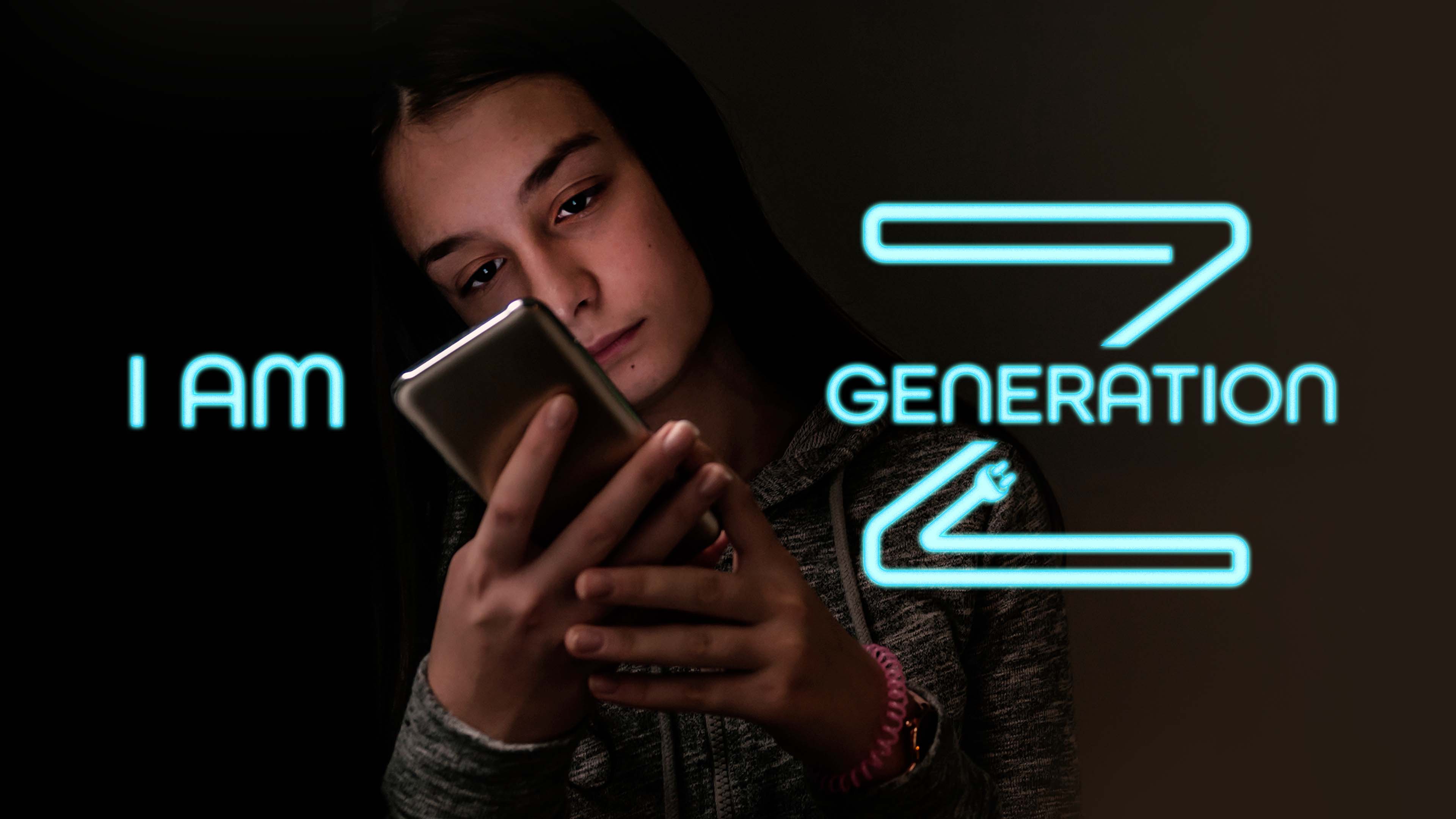Gen Z is the first fully tech-connected generation. Growing up in an era of climate change, the devastating COVID pandemic, and intense political polarization, we have to ask: Are the kids all right?
◊
Picture this: You’re nine years old, still short in comparison to the tables around you, and you’re wandering around your brightly colored public library, the air perfumed with a mix of newly printed paper and old books. Your eyes are drawn from new book to new book displayed proudly on the shelves at the annual book fair. Finally, your ravenous gaze lands on something sufficiently tantalizing: The words “THE FUTURE” shine from the cover of a book – an illustration of a gleaming silver city, drones flying overhead, emblazoned beneath the title.
You pick it up. Inside, you find descriptions of solar-powered cars, smart homes, wearable tech, artificial intelligence. It all seems fantastical and almost unimaginably futuristic, thrilling to you, a child longing for your beloved iPod Nano to do more than just play music.
What's Gen Z up to? Watch MagellanTV's I Am Generation Z to find out.
Change at Breakneck Speed
Of course, in the years that followed your visit to the library, that excitement was fulfilled. Born in 2000, seemingly every year of my adolescence was marked by some major technological advance that soon turned commonplace. I grew up in an era where it was still possible for my parents to brag that I didn’t use screens at all until the age of three. “We just don’t let her watch TV!” they’d say, proudly. I also remember sitting in the car with my mom listening to an NPR program about the introduction of Siri, Apple’s infamous voice-activated assistant, and only months later I was laughing at Siri’s easy misunderstanding of my carefully enunciated commands. This accelerated technological change has been a central influence on my generation, as elucidated by my colleague Kevin Martin in his article about Gen Z from an outsider’s perspective.
And it hasn’t just been technological change: I was in second grade, conscious and concerned when in 2008 the Great Recession hit, and in third grade when Barack Obama was elected and my teacher at the time dedicated the day to watching his inauguration as the first Black president of the United States. The human population, too, has ballooned from around 6 billion in 2000 to 8 billion today, in only twenty-some years. And with the advent of the Internet, we can all hear each other, loud and clear. Every advance of modernity is obvious, broadcast by every early-adopter, until suddenly – rapidly – the futuristic morphs into the ordinary, the shocking into the normal.
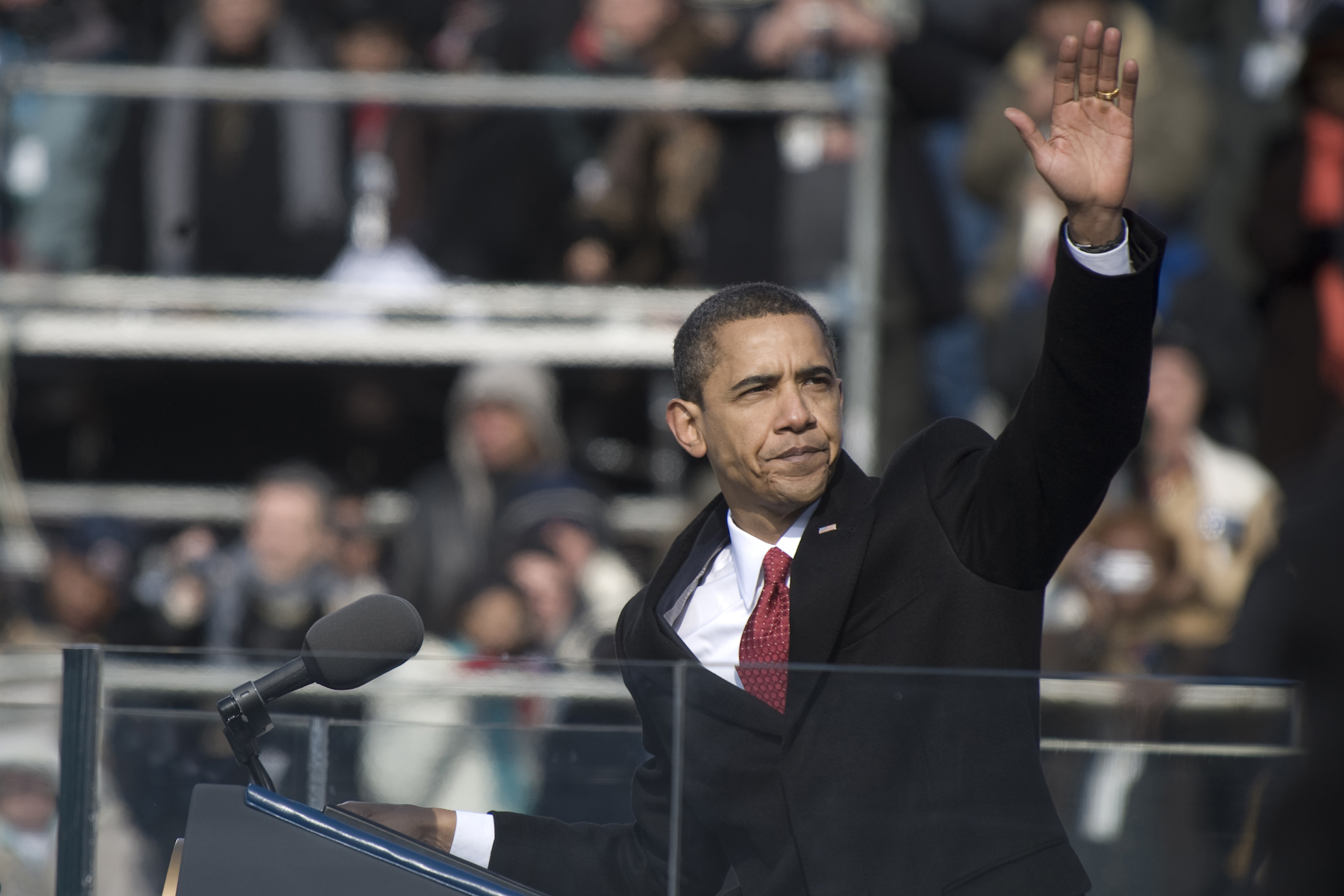
President Barack Obama at his inauguration in 2008 (Credit: Petty Officer 1st Class Chad J. McNeely, USN, via Wikimedia Commons)
Of course, the technological and the social are deeply intertwined. Technology, especially the advent of social media, has dramatically changed the look and feel of modern social interaction. Likewise, social factors like the Coronavirus pandemic and worsening wealth inequality have affected our use of technology. And really, the two have egged each other on until rapid change has become the norm for this new generation.
Generation Z: Formed by Change
Generation Z is the generational cohort born between the years 1997 and 2010 (though some sources mark the beginning of the group at 1995). This makes us between 14 and 27 years old today. I was born in 2000, making me an early member of Gen Z, an age group shaped by the astoundingly rapid clip of technological and societal change.
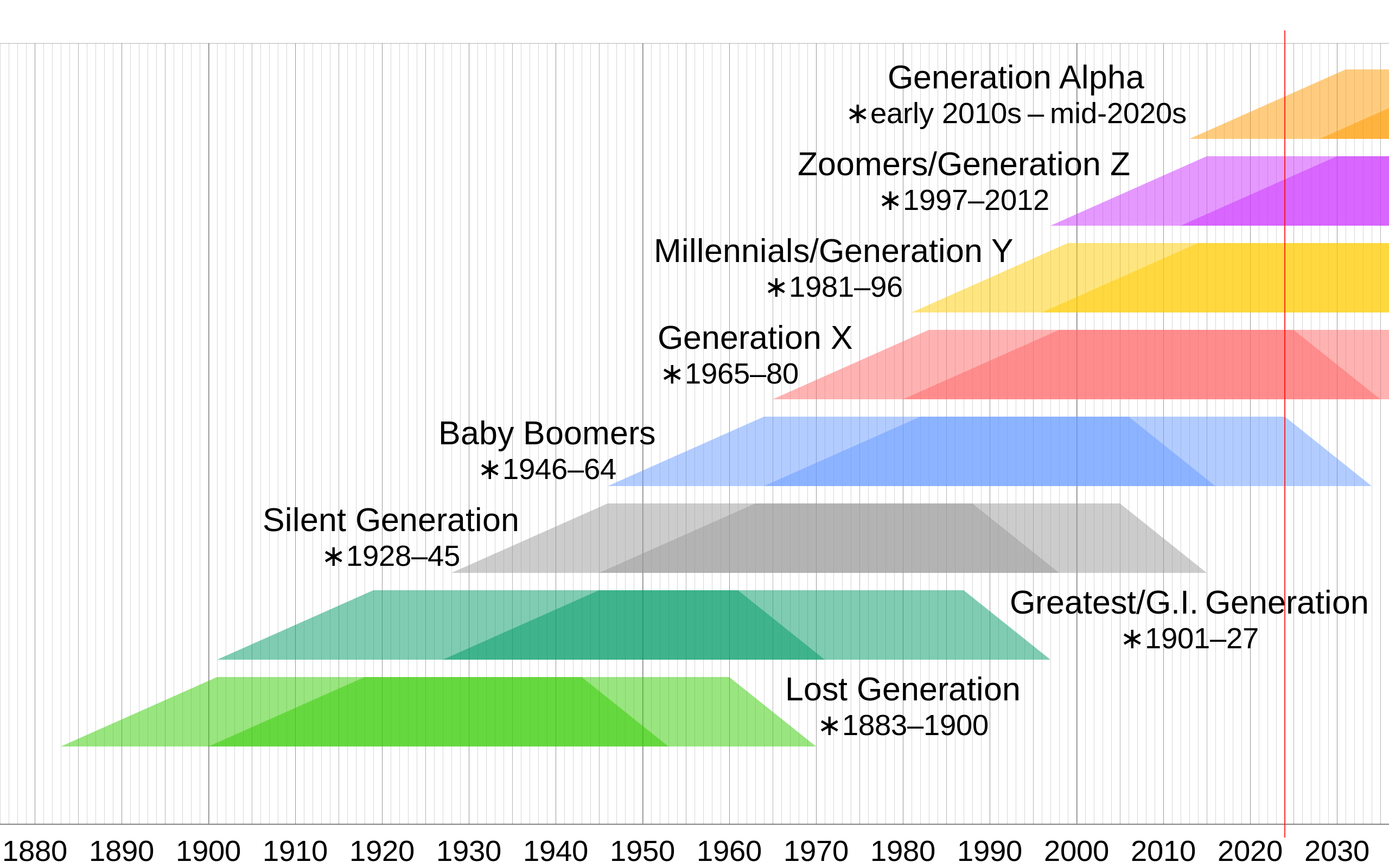
Timeline of generations since late 19th century (Credit: Cmglee, via Wikipedia/Wikimedia Commons)
How would I describe the mood of my generation? Well, I’m hardly a spokeswoman, but I’d say something about world-weariness, pessimism, and a sense of powerlessness – but also a focus on living in the moment rooted not necessarily in hedonism, but rather in uncertainty about the future.
And could you blame us? Gen Z has repeatedly had to come face-to-face with the absurdity of trying to live a “normal” life in a time of increasingly not-normal circumstances. As children, we remained childlike during a historic recession. As teens, we continued going to school despite increasing mass shootings. As emerging adults, we carried on working through a global pandemic. And through it all, we’ve gone on living our technologically-enhanced lives, driving to work and school, getting takeout, using electricity and heat and gas, all as climate change worsens and becomes less reversible.
It’s difficult not to feel complicit, and yet also powerless, knowing that, since the ’80s, only 100 corporations, which we now depend on to live a “normal” life, have produced 70 percent of greenhouse gas emissions. Short of fleeing to the wilderness, the waste disgorged by modern living is nearly impossible to escape.
New Values
Many time-honored Western values – individualism, hard work, striving – have seemingly reached an apex. Individualism served us, until a global pandemic forced us to acknowledge our interdependence. Hard work has served us, until late-stage capitalism pushed us to our limits with diminishing returns. Many members of Gen Z have watched these changes, and feel dubious of some of these traditional values as a result.
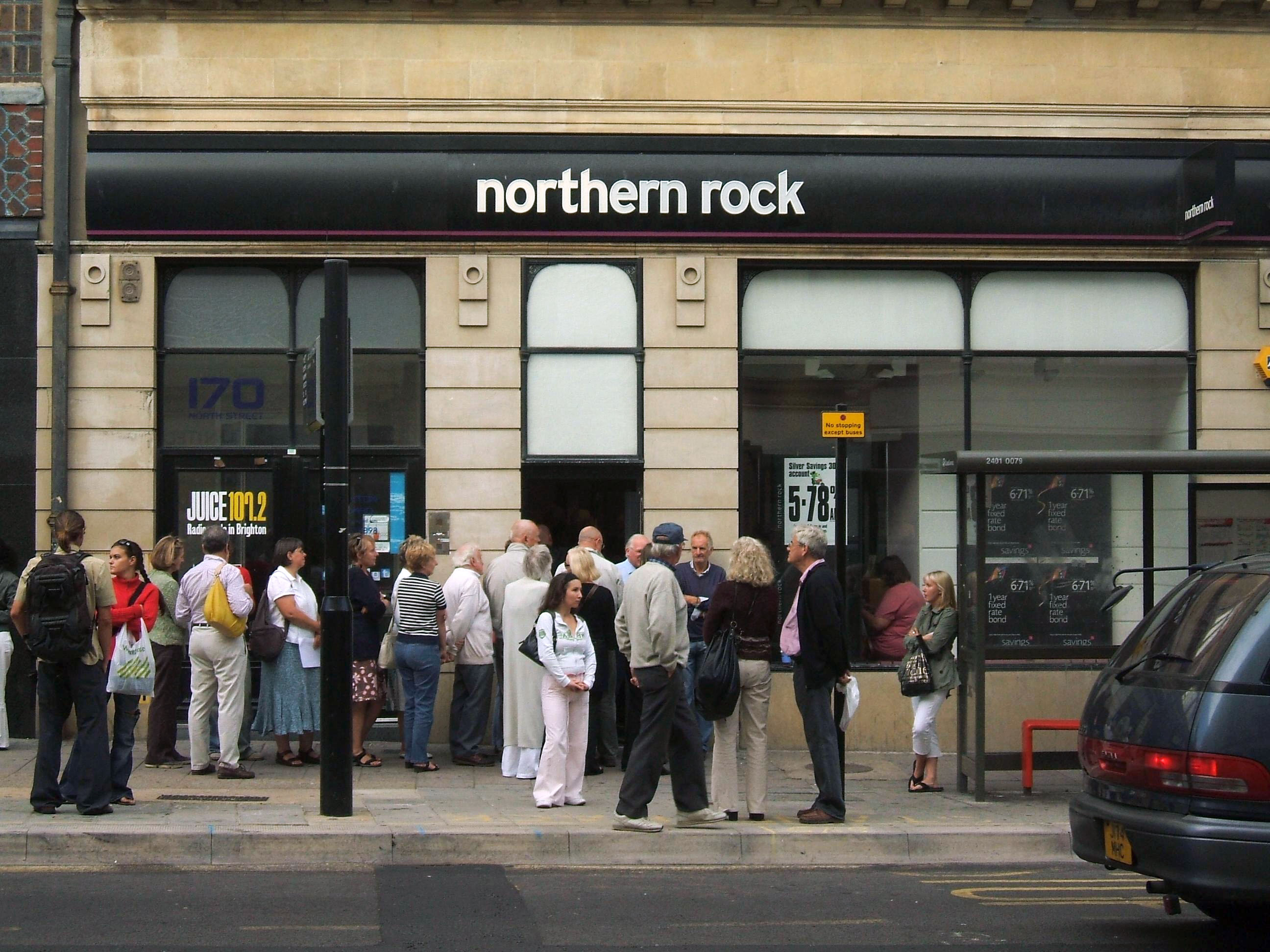
Queue outside a bank in the U.K. to withdraw their money during the 2008 financial crisis (Credit: Dominic Alvez, via Wikipedia/Wikimedia Commons)
As a member of Gen Z, I would point to other traits – cynicism, a comfort with the absurd, a sense of powerlessness, and a drive to enjoy life despite it all – that define my peers and I. Regardless of what marketing consultants might highlight, these characteristics seem more relevant than data about what apps we favor, the single events we’ve experienced, or the slang we use.
Maybe it’s not surprising that, as elementary and middle schoolers, my peers and I developed an unusually voracious appetite for dystopian novels. One year it was Susan Collins’s Hunger Games series that enraptured my entire grade – you could hardly stand in line for the school bus without spotting at least five kids with one of those books in hand. Then, of course, Jennifer Lawrence starred in the blockbuster film adaptation. Next, there was the Divergent series, which also became a major film. Later, in early high school, there was the Handmaid’s Tale TV adaptation and a revival of public attention for Margaret Atwood’s writing in general. Where Millenials had the escapist Twilight series, my generation seemed fixated upon imagining looming disaster.
Gen Z by The Numbers
Of course, this is just one Gen Zer’s opinion on the defining features of the youngest generation. What have polls found to be the uniting features of Gen Z?
Of course, this depends on where in the world the Gen Zers in question are. The experience of a member of Gen Z in Singapore is going to vary dramatically from the experience of a Gen Zer in Nairobi, which is going to be dramatically different from a Gen Zer in Washington, D.C. I was born in the U.S., so my perspective – and the data I rely on – is likely to be more relatable to my American cohort. Still, I believe many of my observations can be generalized to the experiences of fellow Gen Z members in other parts of the world.
In the U.S., Generation Z is demographically unique. In fact, it is the most diverse American generation thus far. In 2020, a Pew Research Center report indicated that a slim majority of Gen Zers are considered non-Hispanic White. Still, the U.S. Census Bureau projects that Gen Z will be the first generation to be majority non-White by 2026. And, although only six percent of Gen Z are immigrants themselves, 22 percent – nearly a quarter of Gen Z – are the children of immigrants.
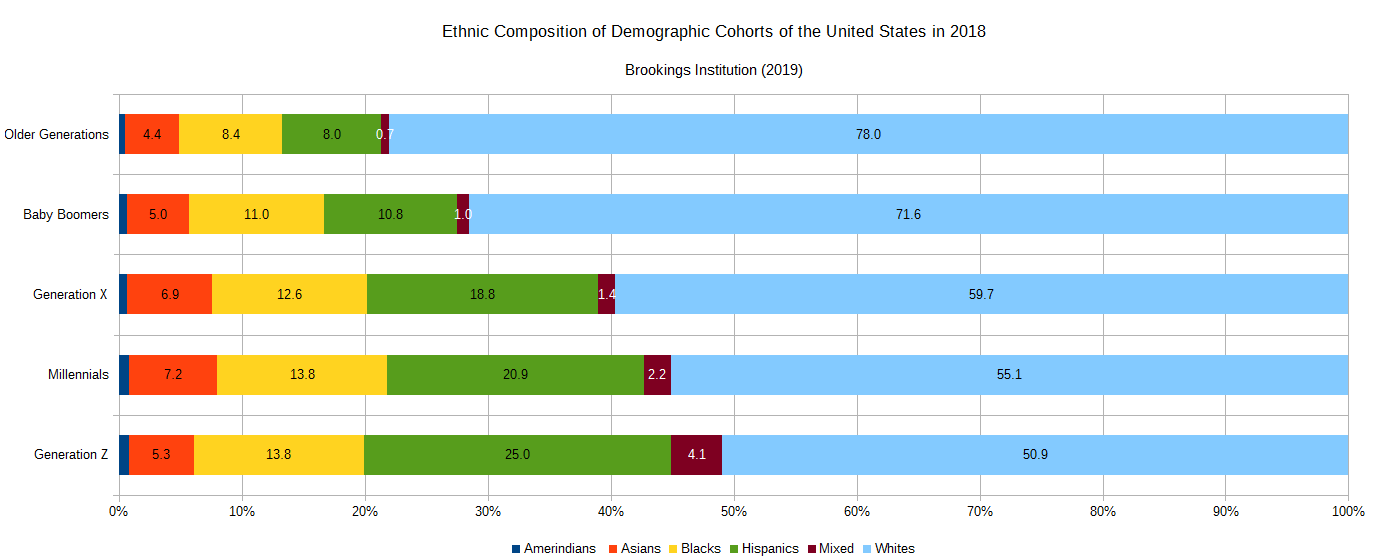
Composition of demographic cohorts of U.S. generations (Credit: Nerd271, via Wikipedia/Wikimedia Commons)
Generation Z is also likely to become America’s best-educated generation. Pew Research Center found in 2020 that members of Gen Z are “less likely to drop out of high school and more likely to be enrolled in college. Among 18- to 21-year-olds no longer in high school in 2018, 57% were enrolled in a two-year or four-year college. This compares with 52% among Millennials in 2003 and 43% among members of Gen X in 1987.” There are a handful of potential reasons for this: For one, members of Gen Z are much more likely than previous generations to have grown up with a college-educated parent. In 2019, 44 percent of Gen Zers ages 7–17 had a parent with at least a bachelor’s degree, while for Millenials at the same age, that figure was 33 percent. And, for another, Generation Z has come of age with constant access to the near-infinite information offered by the Internet. Navigating that barrage of information – distinguishing fact from fiction, or even discovering something in between – is a distinctly Gen Z challenge. And, of course, it’s one that we’ve faced continuously since childhood, unlike preceding generations.
Both of these factors could potentially contribute to a more globalist, open-minded, yet critical viewpoint. Most members of Gen Z have been exposed to cultures other than their own early and repeatedly, whether through family, friends, or the Internet. And they have also been taught critical thinking, whether through their own educational experiences or by their educated parents.
Standing Up to Climate Change
Another defining experience of the youngest generation is, as I’ve mentioned, Gen Z’s engagement with the reality of climate change. Pew Research Center's findings are again strikingly instructive:
Anxiety about the future also is a predominant emotional reaction to climate change content among those who are most engaged with the issue on social platforms (those who follow a climate-focused account, interact with, post or share climate content themselves). Majorities of these climate-engaged social media users report feeling angry that not enough is being done when encountering climate change content online; but large shares also say they feel motivated to learn more and confident in the ability to reduce the effects of climate change.
Clearly, climate change is on the minds and in the hearts of the youngest generation. This remains true across the political spectrum. Although Democrats generally agree that “action to reduce the effects of climate change needs to be prioritized today, even if that means fewer resources to deal with other important problems,” younger Republicans differ significantly from older generations on this issue. Forty-nine percent of Gen Z Republicans agree with the above statement, while only 37 percent of Gen X and 26 percent of Baby Boomer and older Republicans agree.
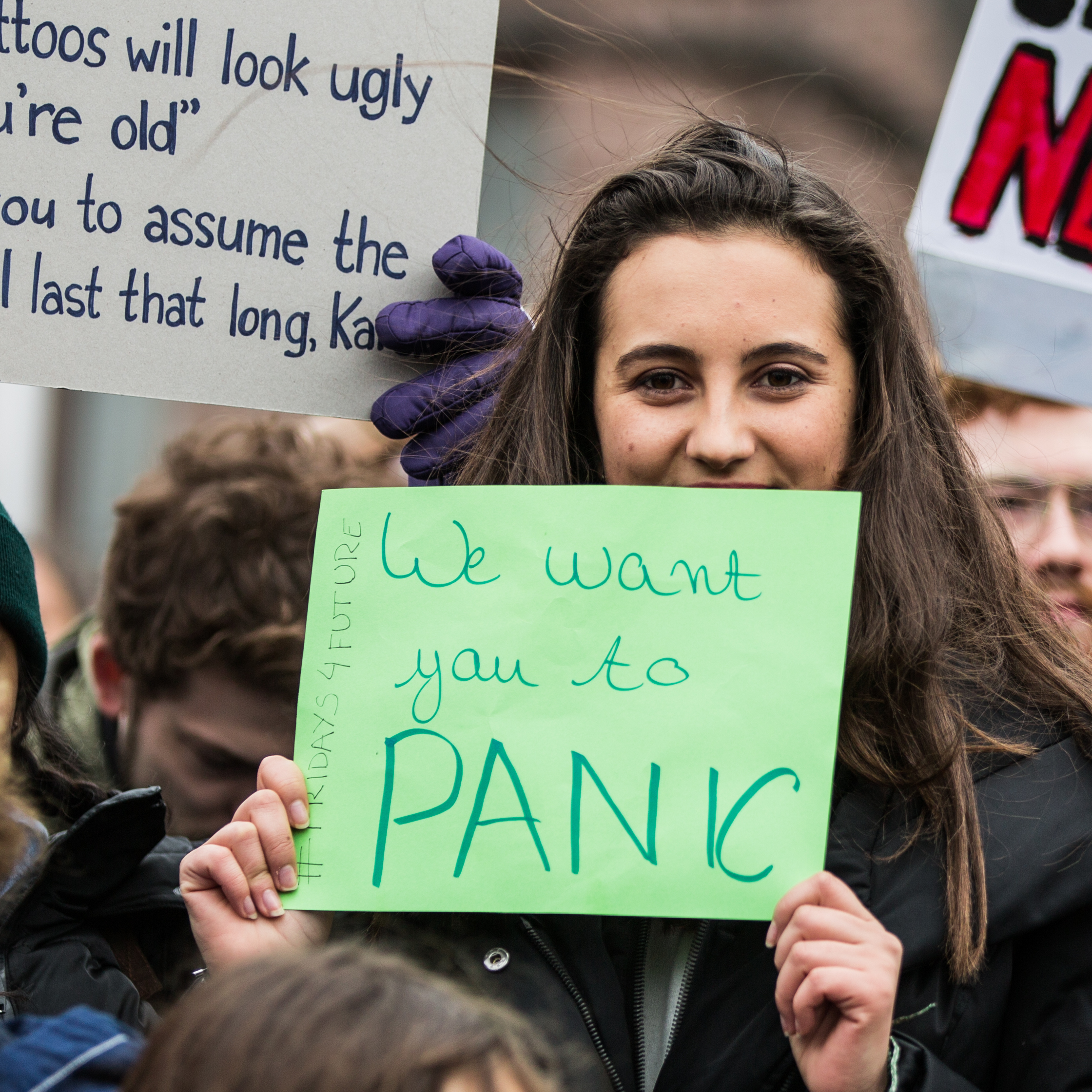
Toronto climate change activist Alienor Rougeot, 2019 (Credit: Dina Dong, via Wikipedia/Wikimedia Commons)
And what does Gen Z think should be done about this pressing issue? Interestingly, American members of Generation Z are distinct in their support for a more activist government. They are much more likely than previous generations to see the government as playing a central, constructive role in solving the nation’s problems, rather than relying on businesses or individuals. As Pew puts it, “Fully seven-in-ten Gen Zers say the government should do more to solve problems, while 29% say the government is doing too many things better left to businesses and individuals.”
Generation Z Takes on a Brave New World
As a child, that book for sale at my local book fair offered an uncomplicated, thrilling view of the future. It was exciting, but it was also simplistic – the world I now live in is as filled with exciting and fascinating technological advances as it is full of imminent danger.
Despite the advantages of more involved and better-educated parents, significant advances in social equality, and amazing tech literally at our fingertips, the challenges left to Generation Z are daunting: Save the planet from runaway climate change; reduce gaps between the wealthy and the rest of humankind; and mitigate the downsides of all that great technology. And do it while somehow developing coping mechanisms that allow us to go on with reasonably normal lives.
It’s a lot! But if the many outspoken activists of Gen Z – including Greta Thunberg, Blair Imani, X or Emma Gonzalez, and Malala Yousafzai – tell us anything, it’s that Gen Z has as much hope and determination as we do worry. And hasn’t that always been true of young people?
Ω
Sari Wagner is a contributing writer for MagellanTV. Originally from Philadelphia, she is a graduate of Kenyon College with a degree in neuroscience and studio art. An early member of Gen Z, she is as curious as you are about how her generation will face the many challenges presented to them!
Title Image: Adobe Stock


